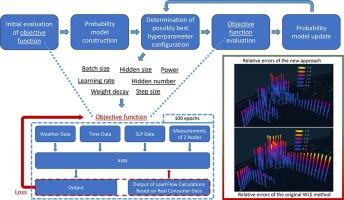Deep neural network based distribution system state estimation using hyperparameter optimization
IF 6
Q1 ENGINEERING, MULTIDISCIPLINARY
引用次数: 0
Abstract
In the past decade, distribution system state estimation has become a crucial topic in power system research due to the increasing importance of distribution networks amidst the decline of centralized energy production. This paper addresses a gap in the literature regarding the application of modern hyperparameter optimization techniques in low-voltage distribution system state estimation using deep neural networks. In particular, it demonstrates the use of the Tree-structured Parzen Estimator algorithm, which is a Bayesian hyperparameter optimization method, for distribution system state estimation on real Hungarian low-voltage networks. The study uses data from four real-life low-voltage supply areas in Hungary, which were modeled to address the challenges in obtaining network information. Compared to traditional methods like the weighted least squares method, the Tree-structured Parzen Estimator algorithm significantly improves the accuracy of the voltage amplitude and angle estimations, reducing the relative error by 14–73%. Additionally, it is shown that TPE outperforms simpler methods like Random Search in hyperparameter optimization. The results also reveal connections between the distribution system size and optimal hyperparameters, such as batch size, learning rate, and hidden layer configuration. The proposed non-iterative algorithm, combined with the parallel computation capabilities of deep neural networks utilizing GPU, resulted in four orders of magnitude improvement in runtime. These advancements make the proposed approach a valuable tool for renewable energy integration planning and real-time monitoring, highlighting its potential for practical applications in the power industry.

利用超参数优化进行基于深度神经网络的配电系统状态估计
近十年来,随着集中式能源生产的衰退,配电网的重要性日益增加,配电系统状态估计已成为电力系统研究的一个重要课题。本文探讨了现代超参数优化技术在利用深度神经网络进行低压配电系统状态估计方面的应用,填补了文献空白。特别是,它演示了在匈牙利实际低压网络中使用树状结构 Parzen 估算器算法(一种贝叶斯超参数优化方法)进行配电系统状态估算。该研究使用了匈牙利四个实际低压供电区域的数据,这些区域的模型是为了应对获取网络信息方面的挑战而建立的。与加权最小二乘法等传统方法相比,树状结构帕尔岑估计器算法显著提高了电压幅值和角度估计的准确性,相对误差减少了 14-73%。此外,研究还表明,在超参数优化方面,TPE 优于随机搜索等简单方法。研究结果还揭示了配电系统规模与最优超参数(如批量大小、学习率和隐层配置)之间的联系。所提出的非迭代算法与利用 GPU 的深度神经网络并行计算能力相结合,使运行时间缩短了四个数量级。这些进步使所提出的方法成为可再生能源集成规划和实时监控的重要工具,凸显了其在电力行业的实际应用潜力。
本文章由计算机程序翻译,如有差异,请以英文原文为准。
求助全文
约1分钟内获得全文
求助全文
来源期刊

Results in Engineering
Engineering-Engineering (all)
CiteScore
5.80
自引率
34.00%
发文量
441
审稿时长
47 days
 求助内容:
求助内容: 应助结果提醒方式:
应助结果提醒方式:


